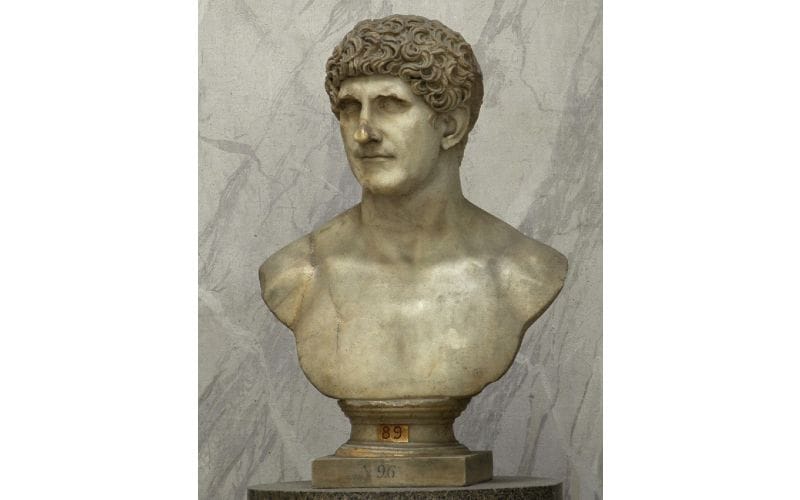100 Heroes: Mark Antony
The gay man who shaped Ancient History.

Marcus Antonius – commonly known in English as Mark Antony – was a Roman politician and general who played a critical role in the transformation of the Roman Republic from an oligarchy into the autocratic Roman Empire.
Early life
Antony was born in Rome in the year 83 BC.
Antony’s early life was characterised by a lack of proper parental guidance. His father had died in battle and his mother had remarried.
The Men
According to the historian Plutarch, Antony spent his teenage years wandering through Rome with his brothers and friends gambling, drinking, and becoming involved in scandalous sexual relationships with men.
One of the most notable affairs was with Gaius Scribonius Curio.
Military service
In 57 BC, Antony joined the military staff of Aulus Gabinius, the Proconsul of Syria, as chief of the cavalry. This appointment marks the beginning of his military career.
In the years that followed, the alliance of Marcus Licinius Crassus, Gnaeus Pompey Magnus, and Gaius Julius Caesar – the First Triumvirate – took control of the Roman Republic. This was favourable for Antony’s prospects – Antony secured a position on Caesar’s military staff in 54 BC and was part of the conquest of Gaul where he demonstrated his military leadership and positioned himself for a political career.
Civil war
The death of Crassus ended the First Triumvirate, leaving Pompey and Caesar battling for power and control.
Pompey succeeded in taking control of the Senate and stripping Caesar of his command. Caesar responded by leading his forces in a march against Rome – a march that began with the crossing of the Rubicon river. Antony marched alongside Caesar as his second-in-command.
After an extended campaign, Caesar eventually defeated Pompey. This ended the Republic and established Caesar as Emperor. Antony was his second-in-command.
Assassination of Caesar
In order to prevent Caesar from consolidating his hold on power, a group of Senators resolved to Assassinate Caesar and restore the Republic. The main conspirators were Marcus Junius Brutus and Gaius Cassius Longinus. Caesar was killed in the Senate.
In the turmoil surrounding the death of Caesar, Antony fled to safety and consolidated Caesar’s allies and resources. He returned to Rome and negotiated a settlement between the factions competing for control. Caesar’s great-nephew – Gaius Octavius, known as Octavian – was recognised as Caesar’s heir, however Antony effectively took control.
Conflict with Octavian
Octavian sought to establish his claim to the legacy and wealth of Caesar, presenting himself as an alternative to Antony.
Antony lost support and was forced to leave Rome.
The Second Triumvirate
As Octavian looked to consolidate his position within the empire, he sought an alliance with Antony. Along with their ally Lepidus, Octavian and Antony agreed to form a Triumvirate to take control and rule Rome.
Under the pretext of avenging the murder of Caesar, the Triumvirate eliminated their enemies and consolidated power and wealth in their own hands.
Cleopatra
Cleopatra had been supported by Caesar to take control of Egypt – she also had a son with Caesar. She had lived in Rome with Caesar until his assassination, when she and her son had returned to Egypt.
Antony went to Egypt to confirm his support for Cleopatra’s rule – he stayed with her for an extended period and had three children with her.
Antony also had a wife back in Rome – Fulvia. As Octavian sought to build his forces and authority, Fulvia led a growing opposition to Octavian’s rule. Fulvia’s opposition to Octavian eventually spilled over into open conflict and civil war. Octavian was victorious, further strengthening his rule. Fulvia’s defeat forced Antony to return to Rome and secure a new alliance with Octavian. The alliance held for a while, but tensions soon began to emerge again.
Octavian moved against Antony, invading Egypt. Defeated, Antony took his own life. With Antony finally out of the way, Octavian became uncontested ruler of Rome.
